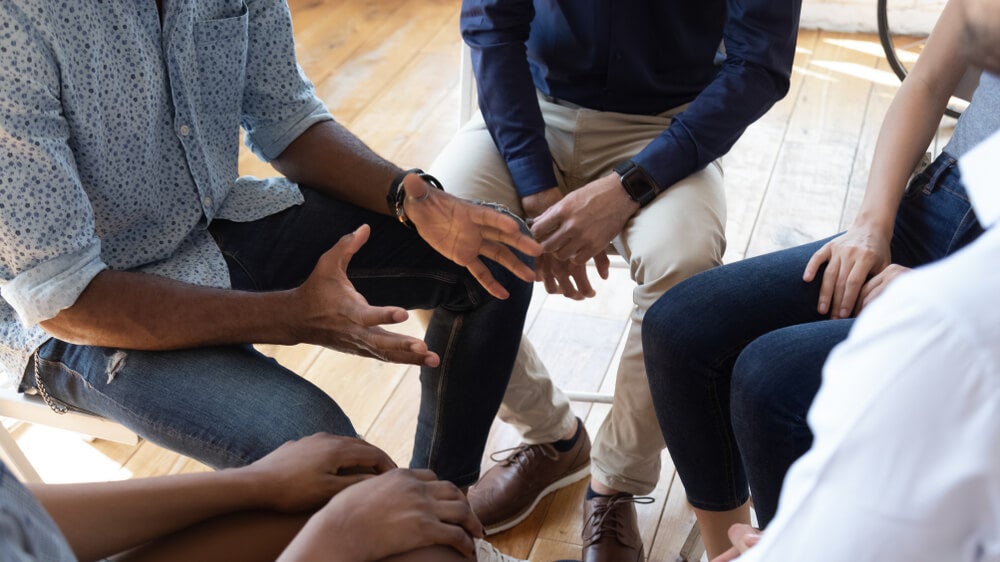Male circles are a practice recovered from antiquity with great psychological advantages.
In the past it was common to gather around a campfire to share stories, solve problems, receive advice, learn, express fears, etc. Today, many men find in this dynamic a safe space to listen and be heard for the first time.
- It is quite possible that some people find it strange that a group of complete strangers gather in a room or in a corner of the forest to seek support.
- Reveal intimacy.
- Frustrations and doubts.
This seems even more unusual for the male sex, less likely (on average) to share deeper and, above all, emotional aspects with other men.
We live in a society where masculinity, in capital letters, has followed for decades a very rigid hegemonic model, the construction of male identity was almost like a mold to which everyone had to adapt to the letter and without asking questions.
In this inflexible scheme, there was no room for doubt, emotions and, lessover, vulnerabilities.
Michael Kimmel, founder and director of? Center for the Study of Man and Masculinities?From Stony Brook University in New York, he points out that fortunately, all of this is changing.
Now we can talk about more than one type of masculinity; scope has been expanded to include any kind of identity, expression, and need.
One way to delve deeper into this and other aspects is through male circles.
“Has conventional masculinity always become the most powerful, the most dominant, the most aggressive and the most successful?Was it forbidden to be vulnerable?.
There is an interesting fact to reflect on: the number of suicides among men is three times higher than that of women; in Spain, for example, 75% of those who decided to kill themselves were men.
The same is happening in other countries, proving that when it comes to gender, it seems that they are opting for the most dramatic premiere of all.
However, the World Health Organization (WHO) notes in its suicide prevention report that there is no explanation as to why this happened, we do not know what is causing it, but it is a fact that we do not have sufficient resources.
For example, subject matter specialists, such as Dr. Brené Brown, a professor and researcher at the University of Houston, say that men generally tend to feel a lot of pressure compared to what is expected of them.
Being a man has always been synonymous with power, resolution, domination, self-control and success. Realities such as unemployment, lack of prospects, identity problems, inability to manage failures, etc. , often lead to unsonable gaps.
In most cases, the gender roles they are often exposed to isolate them, all of which place them in a reality where there is no emotional honesty, where vulnerability becomes anger and therefore mental health problems.
Today, male circles are becoming an ideal resource to transform and reshape the concept of masculinity, in these spaces are men who do not know each other, of different ages and social backgrounds.
If there’s one thing most of us know, it’s that sometimes talking to a complete stranger allows us to communicate and express aloud things we wouldn’t share with family or friends.
In a society so accustomed to judging or accusing certain behaviors and words, men often feel this weight, a burden that also comes, in most cases, from education, through which they are encouraged to be strong, to hide their feelings.
In male circles, there is therefore a safe space to open up, be honest and find the validation and support of other men.
The purpose of male circles is as positive as it is stimulating. The goal is to make men feel emotionally mature, powerful and compassionate to heal their own wounds and help others. It is a firm commitment to personal development.
The dynamics and benefits that each of them will find in these circles are:
Men’s dating circles are gaining popularity. They are increasingly present in the UK, Australia, Spain, the Nordic countries, etc. Besides, it’s interesting to know that in America they’ve always had a great tradition.
The MandKind Project, for example, has been working on personal care and men’s development for more than 30 years and, to date, has subsidiaries around the world.
In this way, anyone who wants to contact these groups only has to search and approach one of these centers specialized in these dynamics, sometimes a small decision generates a big change when we need it most.

